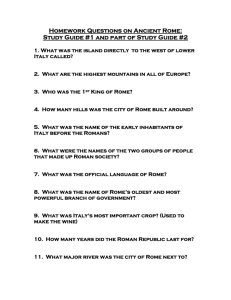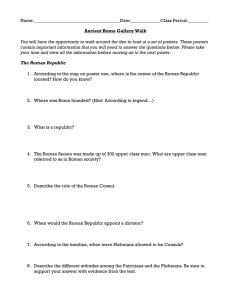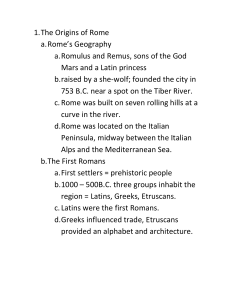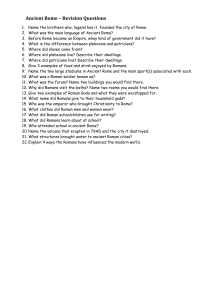File - Mr. Ryan Teaches History
advertisement
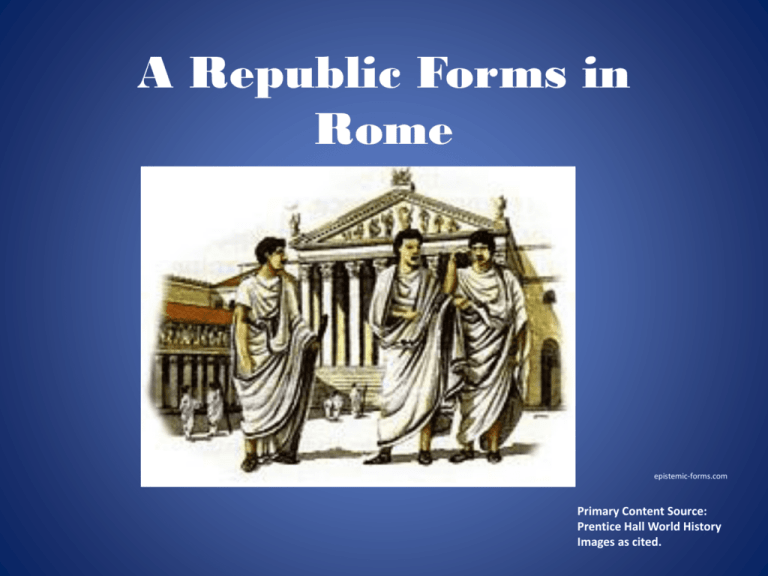
A Republic Forms in Rome epistemic-forms.com Primary Content Source: Prentice Hall World History Images as cited. Rome began as a small city-state in Italy but ended up ruling the entire Mediterranean world. cosworldhistory.pbworks.com The Italian peninsula looks like a boot, jutting into the Mediterranean Sea. The peninsula is centrally located in the Mediterranean, and the city of Rome is in the center of Italy. bible-history.com This location helped the Romans as they expanded. Because of its geography, Italy was much easier to unify than Greece. Unlike Greece, Italy was not broken up into small, isolated valleys. vampirehigh.org Italy also had the advantage of broad, fertile plains. These plains supported a growing population. lazioexplorer.com The ancestors of the Romans, the Latins, migrated into Italy by about 800 B .C. For a time, the Etruscans ruled much of central Italy, including Rome itself. crystalinks.com The Romans adapted the Etruscan alphabet and the use of the arch in building and engineering techniques. spartacus.schoolnet.co.uk The Romans drove out their Etruscan rulers in 509 B.C.E. This date is considered the beginning of the Roman state. muntucha.blogspot.com The Romans set up a new government in which some officials were chosen by the people. They called it a republic. Romans thought a republic would keep any one individual from gaining too much power. studyingsocieties.wikispaces.com The most powerful body of the republic was the senate. Its 300 members were all patricians, the landowning upper class. The senate elected consuls to supervise the business of the government and command of the armies. They served only one term. simplyrome.org In the event of war, the senate might choose a dictator, who had complete control over the government. Each term was limited to six months. yeseniaramirez14.blogspot.com Cincinnatus was seen as a model dictator. He organized the army, led the Romans to victory over the attacking enemy, attended victory celebrations, and returned to his farmlands – all within 16 days. cincinnativiews.net Plebeians, the farmers, merchants, artisans, and traders who made up the bulk of the population, had little influence in government. Their efforts to share power shaped politics in the early republic. crystalinks.com Plebeians had argued that the republic’s laws were not written down and accessible to all. The Laws of the Twelve Tables set up in the Forum (marketplace) made it possible for plebeians to appeal judgments handed down from the patricians. schools.scusd.edu Over time, the plebeians gained the right to elect their own officials , called tribunes, to protect their interests. The tribunes could veto, or block, laws that they felt were harmful to plebeians. Eventually, plebeians were also chosen as consuls to the Senate. fineartamerica.com As Rome’s political and social systems evolved at home, its armies expanded Roman power across Italy. theancientworld.net Rome’s success was due to skillful diplomacy and to its loyal, welltrained army. The basic military unit was the legion, made up of about 5,000 men. picsbox.biz Roman armies consisted of citizen-soldiers who fought without pay and supplied their own weapons. Roman citizens made good soldiers because they were brought up to value loyalty, courage, and respect for authority. mitchellteachers.org To ensure success, Roman commanders mixed rewards with harsh punishment. Young soldiers who showed courage in action won praise and gifts. If a unit fled from battle, however, 1 out of every 10 men from the disgraced unit was put to death. quizlet.com Rome generally treated defeated enemies with justice. Conquered peoples had to acknowledge Roman leadership, pay taxes, and supply soldiers for the Roman army. In return, Rome let them keep their own customs, money, and local government. dipity.com To a few privileged groups among the conquered people, Rome gave the highly prized right of full citizenship. As a result of such generous policies, most conquered lands remained loyal to Rome. vroma.org To protect its conquests, Rome posted soldiers throughout the land. It built a network of all-weather military roads to link distant territories to Rome. sbceo.k12.ca.us As trade and travel increased, local peoples incorporated Latin into their languages and adopted many Roman customs and beliefs. Slowly, Italy began to unite under Roman rule. www2.rgzm.de

